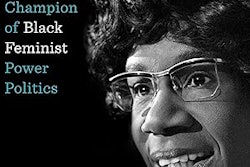Cultivating ‘a better world’ is Dr. Valerie Kinloch’s end goal as an education scholar.
"The work that we do in the world is so important,” said Kinloch, describing her hopes for advancing equitable policies and practices that benefit students, faculty, staff, communities of people in schools, school districts, and universities around the world.
“To advance equitable policies that are grounded in education is to understand the full humanity of people,” she said. “It is to understand who people are, people's dreams and hopes, [and] what people want.”
 Dr. Valerie Kinloch
Dr. Valerie Kinloch
For this work, she was surprised to received the university's inaugural Dr. Larry E. Davis Excellence in Leadership Award in November 2022.
“I received the Excellence in Leadership Award I think because of my vision for education, the efforts that I have made to not only shape education but to reimagine education through a more equitable lens, and to involve people in this collective effort to ensure that higher education is responsive to the needs of people in communities across the world,” said Kinloch.
One such effort was Kinloch’s major initiative to have conversations about strategic direction, culminating in a strategic plan she led that involved faculty, staff, students, and external partners.
Kinloch said that, when she asked questions about how to move the work of UPitt’s School of Education forward, “some of the things that I heard included focusing on community engagement, thinking about policy, thinking about practice in relation to teaching and teacher education.”
Kinloch said there were questions about how to do the work more equitably, by “involving more voices, more people, and by really understanding the need for our School of Education to be a space and a place by which we are taking up educational issues, we are thinking about educational trends, and we are engaging different groups of people.”
UPitt’s strategic plan focuses on equity, justice, and innovation, continued Kinloch, noting her creation of a new position, the associate dean for equity, justice, and strategic partnerships. The individual in that position reports to her. Furthermore, bylaws and governance structure of the school have been overhauled to make them more equitable, engaging, and inclusive of perspectives particularly from people whose voices often are not heard in higher ed, she said.
“If we can get this work done right, ... through humanizing collective frameworks that just see the beauty in human beings ... then I really think that we can beautifully change and transform the world where it’s so inclusive of all of who we are, and people are able to engage in the work that their souls are meant to do,” said Kinloch.
Having served six years as associate dean of diversity, inclusion, and community Engagement in Ohio State University’s College of Education and Human Ecology (EHE), Kinloch is well-versed in higher ed diversity administration. She also served as director of the EHE Office of Diversity and Inclusion and was program chair for the National Council of Teachers of English and was listed on Education Week’s 2023 RHSU Edu-Scholar Public Influence Rankings.
Kinloch holds a Ph.D. in English and a master’s degree in English and African American Literature from Wayne State University. She earned a bachelor’s degree in English language and literature/letters from Johnson C. Smith University.
While diversity and inclusion are important, Kinloch also focuses on equity and justice.
“I need people to understand that diversity and inclusion are fundamentally important but those things have to lead to equity and justice across education and societies,” Kinloch said.
Kinloch exudes optimism and she invites people to come to the table to talk, to listen, to work together for a brighter future.
“I would just want people to come into these conversations with an open mind, open ears, open hearts, and to ask questions about the things that they might not know as opposed to assume that the work of equity, justice, and innovation ... is bad,” Kinloch said. “Because it's not, it's really fundamentally important for changing the world for the better."


















